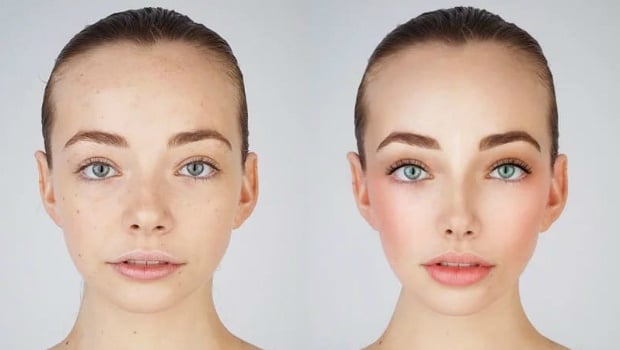
British photographer and director Rankin, asked teens (and pre-teens) of all ethnicities to edit portraits he had taken of them. The subjects of the photographer's #SelfieHarm project edited their images until they believed they were "social media ready".
These edits entail rosier cheeks, longer lashes, sharper, smaller noses and more defined jawlines - basically all the Eurocentric features associated with "perfection".
This project's purpose is not to bring the to the fore the issues surrounding teenage angst and insecurity, but rather it is commentary on the industry and its fixation with flawlessness.
READ MORE: Ever wondered how you can get your Instagram pictures to look like your favourite influencers'?
The teenagers involved in the project also did not, in fact, have any qualms with their original images, but edited according to what they've seen their peers come up with.
These social media ready portraits were shown at an exhibition and panel called "Visual Diet" - a new initiative launched by M&C Saatchi, Rankin and MTArt Agency, which explores the impact of imagery on our mental health, Fashionista reports.
It's a form of digital self harm, as the play on words of the hashtag implies, #SelfieHarm.
For decades, our eyes have been accustomed to poreless smooth faces, matte faces (serious envy from those of us with oily skin), almond shaped eyes and symmetry that would make for better maths problem examples. We were fed this diet for so long, that when a beauty/fashion campaign was served with a side of pores, acne scars, stretch marks and cellulite dimples, we all applauded, forgetting that that's what we see in our daily realities.
READ MORE: Urban Decay showed models with “real skin” and the internet is loving it
This is what Rankin's work aims to speak to. In an interview with Fashionista, he says "I've always had a problematic relationship with Photoshop; at one point, celebrities, brands and magazines would tirelessly demand it, and so it became a large part of my job."
"People are mimicking their idols, making their eyes bigger, their nose smaller and their skin brighter, and all for social media likes. It's just another reason why we are living in a world of FOMO, sadness, increased anxiety and Snapchat dysmorphia. It's time to acknowledge the damaging effects that social media has on people's self-image," he added.
In a world of SnapChat filters and Kardashian cosmetic surgeries, it's common for women who often use social media to feel pressured to use FaceTune, photoshop and their equivalents to match the standard. Of course, for some, this does have its disadvantages - "catfish" is the slur thrown at girls when people feel duped by their selfies, as if anyone would post an unflattering post of themselves just to prove a point about authenticity.
In some cases, the catfish backlash is offensive and can further feed into the dysmorphia triggered by platforms such as Instagram to begin with. For example, a local man recently ridiculed his Tinder date to her face because she wasn't wearing the wig she had in her profile picture.
Girls imagine meeting someone from Tinder for a date and this happens ?????? pic.twitter.com/5SKhqJON65
— Philsner (@PhilsnerDDI) February 12, 2019
She is, without a doubt, not the first young woman to be on the receiving end of this unwarranted humiliation.
This is just one of the issues Rankin's "Visual Diet" has us mulling over with regards to how much social media perfection has warped our perceptions of beauty.
As Fashionista notes, "the photographer argues that these apps are in fact more dangerous and damaging to mental health than the professional use of Photoshop, and there needs to be a larger discussion around that."
We leave you with Rankin's poignant words before your next IG binge:
Sign up to W24’s newsletters so you don't miss out on any of our hot stories and giveaways.




 Publications
Publications
 Partners
Partners










